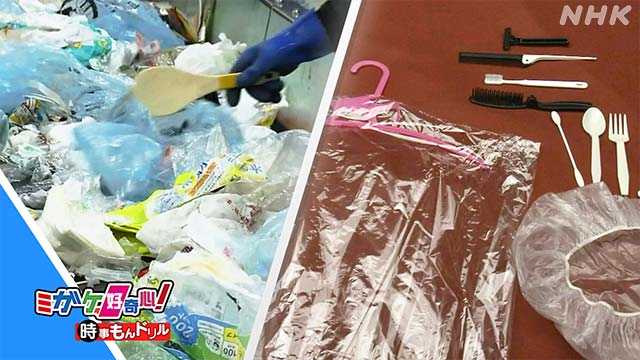Plastic Resource Recycling Law The aim is April 14, 15:12
The theme this time is the issue of plastic waste.
Laws requiring companies to reduce disposable plastic products have been enforced, and the movement to reduce plastics is spreading.
A large amount of plastic waste.
Over 8 million tons are emitted annually in Japan, but only about a quarter are recycled.
Marine pollution caused by dumped plastics has become a serious international problem, and urgent action is desired.
What is the Plastic Resource Recycling Law?
Under these circumstances, the "Plastic Resource Recycling Law," which requires companies to reduce the number of disposable plastic products, came into effect in April.
What is the aim?
We asked Misuzu Asari, an associate professor at the Graduate School of Kyoto University, who specializes in environmental education.
Mr. Asari
"I think I knew that there was a problem with plastics, and I knew that I had to reduce it, but I couldn't act. The Plastics Resource Recycling Law is a law that will firmly and systematically promote it. "
The new law targets 12 plastic products that companies and others offer primarily free of charge, such as convenience store forks and spoons, hotel combs and razors, and laundry hangers.
Companies are required to make efforts to reduce the amount, and if it is extremely insufficient, they will receive a recommendation or announce the company name, and if the response does not change, a fine of up to 500,000 yen will be imposed.
Mr. Asari
"We will thoroughly reduce the number of 12 items of disposable plastics. I think this is a very big turning point."
So what kind of initiatives are companies starting?
Major coffee chains will stop offering cup lids for cold drinks in the store.
In addition, some major convenience stores have introduced wooden spoons and spoons and forks with holes in the handles and shortened lengths of about 1 cm in an attempt to reduce the amount of plastic.
A major hotel chain has removed the plastic toothbrushes in the guest rooms and switched to taking them from the front desk as much as they need.
Mr. Asari points out that the enforcement of this law is a big step to encourage the efforts of these companies and change our way of thinking about plastics.
Mr. Asari
"Until now, it has been regarded as a service to carefully wrap it in plastic and give it as much as possible so as not to inconvenience the customer. From now on, the opposite is true. We do not give extra things as much as possible. That is the customer. The perspective of evaluation may change drastically if it is good for both society and society. "
Plastic alternatives under development
And now, various alternatives are being developed to reduce plastics.
First, this tableware.
In fact, rice is used.
By mixing waste rice, which cannot be used for livestock feed, with plastic, we use less plastic than conventional ones.
There are also alternatives made entirely from plant-derived ingredients.
This tableware is made of bamboo and starch.
There are also tableware made entirely of potato starch.
This one has the taste of shrimp crackers and can be eaten.
Surprising alternative straws !? Reuse method
Even more noteworthy is this straw.
It is made from a plant called lepironia, but it is also reused in unexpected places so that it does not become garbage after use.
The place is a zoo.
It is being reused as a penguin bed.
When the keeper tried putting this straw, which had been used up, into the breeding facility, the penguins carried it into the birdhouse and spread it.
Mr. Tatsuya Sasaki, who planned the reuse of alternative straws.
Mr. Sasaki
"It's very similar to the penguins' nest material, so I wanted to use it there, so I thought it would be useful somewhere, so I think it's OK."
This time, we introduced the efforts of companies to reduce plastic waste, but the law requires us to select products that can reduce plastic waste.
In addition to the introductions, various ingenious alternatives are beginning to be made, so it would be great if we could contribute to the reduction while having fun.
In "Migake, Curiosity!" Of "Weekly Maru-Knowledge News" (broadcast at 8:25 am on Sunday), we will delve into the news every week on the subject of current affairs given in the entrance examination.
Let's think of "why?", In fact, "in the first place" that you want to know as a Kamakura caster.
You can also review the past on the homepage of the corner.
Please take a look from the link below.
https://www3.nhk.or.jp/news/special/maruwaka-migake/

